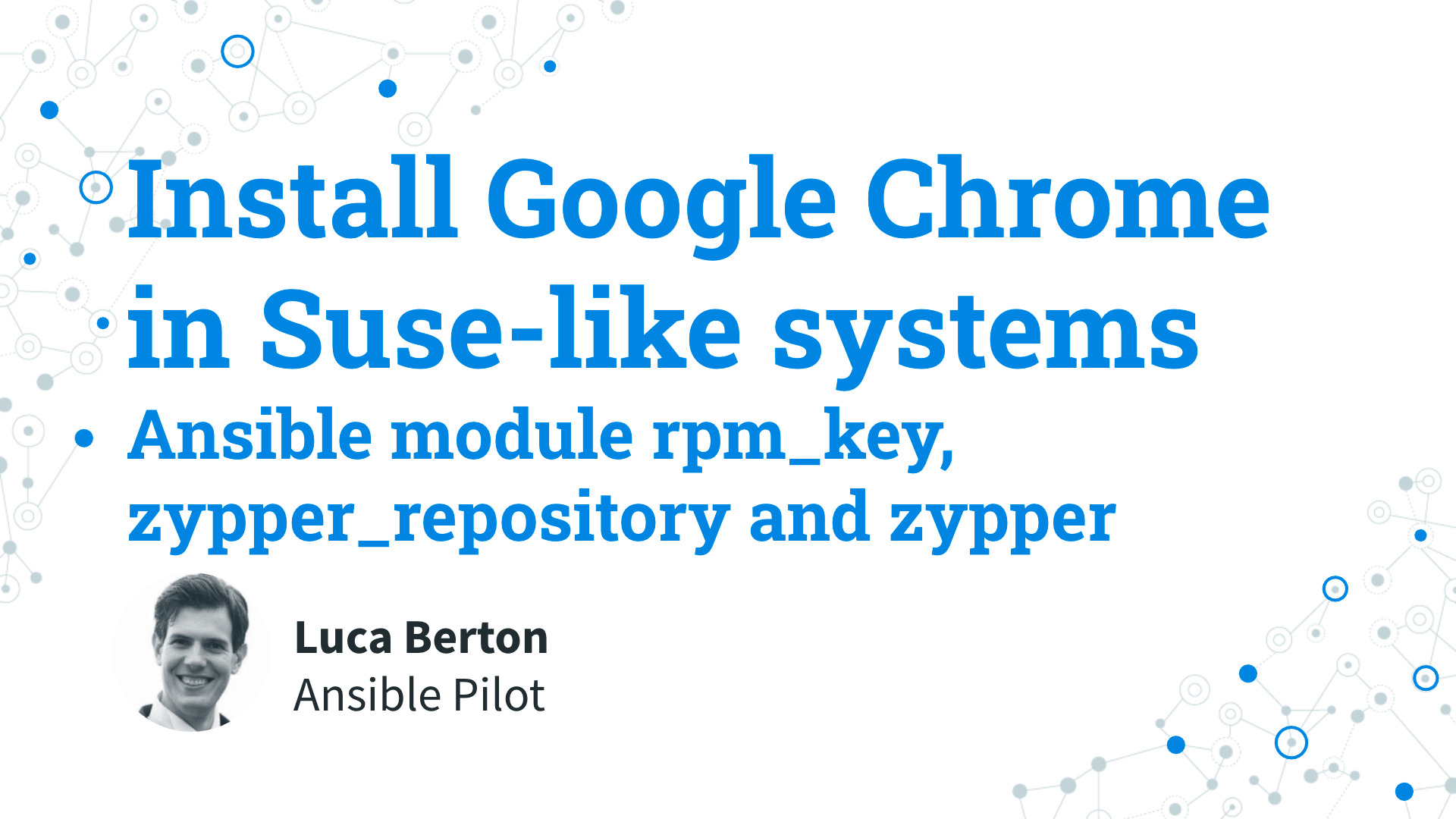How to Install Google Chrome in Suse-like systems with Ansible? I’m going to show you a live Playbook with some simple Ansible code. I’m Luca Berton and welcome to today’s episode of Ansible Pilot.
Ansible install Google Chrome in Suse-like systems
- Add Google Chrome key => ansible.builtin.rpm_key
- Add Google Chrome repository => community.general.zypper_repository
- Update yum cache and install Google Chrome => community.general.zypper
In order to install Google Chrome on a Suse-like system, we need to perform three different steps.
The first step is to download the GPG signature key for the repository. You are going to use the ansible.builtin.rpm_key Ansible module.
This encrypted key verifies the genuinity of the packages and the repository and guarantees that the software is the same as Google releases.
The second step is to add the add Google Chrome repository to the distribution. It’s an extra website where zypper, your distribution package manager, looks like for software.
You are going to use the community.general.zypper_repository Ansible module.
The third step is to refresh the zypper cache for the available packages and install Google Chrome using the community.general.zypper Ansible module.
Parameters
rpm_keykey string - URLrpm_keystate string - present/absent
For the ansible.builtin.rpm_key Ansible module I’m going to use two parameters: “key” and “state”.
The “key” parameter specifies the URL or the key ID of the repository GPG signature key and the “state” verify that is present in our system after the execution.
- zypper_repository name string
- zypper_repository description string - repository
- zypper_repository repo string - URL
- zypper_repository auto_import_keys boolean - GPG signature
For the community.general.zypper_repository Ansible module I’m going to use four parameters: “name”/“description”, “repo”, and “auto_import_keys”.
The “name” and “description” parameters specify the repository name in the Suse system and the “repo” URL of it.
The “auto_import_keys” parameter enables the GPG verification and imports of the suitable keys.
- zypper name string - name or package-specific
- zypper state string - latest/present/absent
- zypper update_cache boolean - no/yes
For the community.general.zypper Ansible module I’m going to use three parameters: “name”, “state” and “update_cache”.
The “name” parameter specifies the package name (Google Chrome in our use-case) and the “state” verify that is present in our system after the execution.
Before installing the package the “update_cache” performs a refresh of the zypper cache to ensure that the latest version of the package is going to be downloaded.

Playbook
Let’s jump into a real-life Ansible Playbook to install Google Chrome in Suse-like systems.
code
- install_chrome_suse.yml
---
- name: install Google Chrome
hosts: all
become: true
tasks:
- name: Add rpm signing key
ansible.builtin.rpm_key:
key: https://dl.google.com/linux/linux_signing_key.pub
state: present
- name: Add repository into repo list
community.general.zypper_repository:
name: google-chrome
description: google-chrome repository
repo: http://dl.google.com/linux/chrome/rpm/stable/x86_64
auto_import_keys: true
state: present
runrefresh: true
enable: true
- name: Install google-chrome-stable
community.general.zypper:
name: "google-chrome-stable"
state: latest
update_cache: true
execution
$ ansible-playbook -i suse/inventory install\ chrome/suse.yml
PLAY [install Google Chrome] **********************************************************************
TASK [Gathering Facts] ****************************************************************************
ok: [suse.example.com]
TASK [Add Yum signing key] ************************************************************************
changed: [suse.example.com]
TASK [Add repository into repo.d list] ************************************************************
changed: [suse.example.com]
TASK [Install google-chrome-stable] ***************************************************************
changed: [suse.example.com]
PLAY RECAP ****************************************************************************************
suse.example.com : ok=4 changed=3 unreachable=0 failed=0 skipped=0 rescued=0 ignored=0
before Ansible execution
$ ssh [email protected]
devops@suse:~> sudo su -
suse:~ # zypper se -i google-chrome-stable
Loading repository data...
Warning: Repository 'openSUSE-Leap-42.3-Update' appears to be outdated. Consider using a different mirror or server.
Warning: Repository 'openSUSE-Leap-42.3-Update-Non-Oss' appears to be outdated. Consider using a different mirror or server.
Reading installed packages...
No matching items found.
suse:~ # zypper repos
Repository priorities are without effect. All enabled repositories share the same priority.
# | Alias | Name | Enabled | GPG Check | Refresh
--+-----------------------------------+-----------------------------------+---------+-----------+--------
1 | openSUSE-Leap-42.3-Non-Oss | openSUSE-Leap-42.3-Non-Oss | Yes | (r ) Yes | No
2 | openSUSE-Leap-42.3-Oss | openSUSE-Leap-42.3-Oss | Yes | (r ) Yes | No
3 | openSUSE-Leap-42.3-Update | openSUSE-Leap-42.3-Update | Yes | (r ) Yes | No
4 | openSUSE-Leap-42.3-Update-Non-Oss | openSUSE-Leap-42.3-Update-Non-Oss | Yes | (r ) Yes | No
after Ansible execution
$ ssh [email protected]
devops@suse:~> sudo su -
suse:~ # zypper se -i google-chrome-stable
Loading repository data...
Warning: Repository 'openSUSE-Leap-42.3-Update' appears to be outdated. Consider using a different mirror or server.
Warning: Repository 'openSUSE-Leap-42.3-Update-Non-Oss' appears to be outdated. Consider using a different mirror or server.
Reading installed packages...
S | Name | Summary | Type
---+----------------------+---------------+--------
i+ | google-chrome-stable | Google Chrome | package
suse:~ # zypper repos
Repository priorities are without effect. All enabled repositories share the same priority.
# | Alias | Name | Enabled | GPG Check | Refresh
--+-----------------------------------+-----------------------------------+---------+-----------+--------
1 | google-chrome | google-chrome repository | Yes | (r ) Yes | Yes
2 | openSUSE-Leap-42.3-Non-Oss | openSUSE-Leap-42.3-Non-Oss | Yes | (r ) Yes | No
3 | openSUSE-Leap-42.3-Oss | openSUSE-Leap-42.3-Oss | Yes | (r ) Yes | No
4 | openSUSE-Leap-42.3-Update | openSUSE-Leap-42.3-Update | Yes | (r ) Yes | No
5 | openSUSE-Leap-42.3-Update-Non-Oss | openSUSE-Leap-42.3-Update-Non-Oss | Yes | (r ) Yes | No
suse:~ # zypper se -s google-chrome-stable
Loading repository data...
Warning: Repository 'openSUSE-Leap-42.3-Update' appears to be outdated. Consider using a different mirror or server.
Warning: Repository 'openSUSE-Leap-42.3-Update-Non-Oss' appears to be outdated. Consider using a different mirror or server.
Reading installed packages...
S | Name | Type | Version | Arch | Repository
---+----------------------+---------+----------------+--------+-------------------------
i+ | google-chrome-stable | package | 94.0.4606.81-1 | x86_64 | google-chrome repository
Conclusion
Now you know how to install Google Chrome in Suse-like systems using the official Google repository with Ansible. Subscribe to the YouTube channel, Medium, and Website, X (formerly Twitter) to not miss the next episode of the Ansible Pilot.
Academy
Learn the Ansible automation technology with some real-life examples in my
Udemy 300+ Lessons Video Course.

My book Ansible By Examples: 200+ Automation Examples For Linux and Windows System Administrator and DevOps

Donate
Want to keep this project going? Please donate
